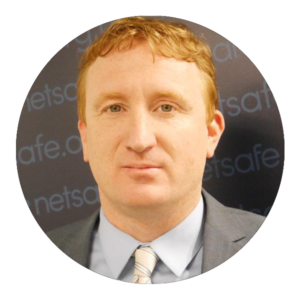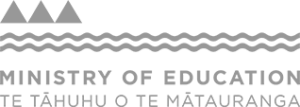CEO Update
Kia ora,
The end of year seems to just get busier and busier – well at least it does at Netsafe!
We shared new insights from our research team, recruited our new Youth Action Squad and ramped up our public education activities. Our 12 Days of Christmas campaign was a nod to the Netsafe of old.
We used our own in-house creativity to take a light-hearted look at some of the stresses the end of year madness brings to remind people that no matter what trouble happens online, Netsafe can help. While the impact of the campaign may not have been immediate, I can tell you that in January we received our highest number of harmful digital communication reports in Netsafe’s history.
Netsafe also returned to talking about, and helping people understand how they can stay safe from scams. We have joined the Scam Calling Code and are working together with the telcos and Government agencies to help protect Kiwis and disrupt scam operations. This is a really important milestone for New Zealand and we’re proud be a part of the Code.
Finally, I wanted to let you know that Helen O’Toole, Director of Operations, has resigned from Netsafe. Helen was an integral part of the team that helped build Netsafe’s harmful digital communications service in 2016 and we wish her all the best.
Ngā mihi,
Martin Cocker
CEO

Director Update
Sean Lyons, Director of Education & Engagement
Netsafe’s Education & Engagement team now lead the organisation’s work and activities for the education sector, the Youth Action Squad and our public engagement activity. This is a diverse, but complementary portfolio and the team are excited by the opportunities to engage with such a broad audience.
We spent some time laying the foundations for 2020 and you may have noticed some of the changes to our look and feel, and how we talk about online safety publicly.
We also worked hard to establish relationships with new organisations and partners. This is so we can ex tend the reach of our current messages and to help more people understand about the service Netsafe provides and how we can support them if they are experiencing an online challenge.
tend the reach of our current messages and to help more people understand about the service Netsafe provides and how we can support them if they are experiencing an online challenge.
You should start to see some of our plans come to fruition as the year continues, but if you have any questions or would like to know how you can get involved, please email me. If you don’t already, you can keep up with our activities by following us on Facebook, Twitter, LinkedIn or Instagram.
Quarterly Results
Overview
Netsafe has seen a decrease in all report categories. This is not an uncommon trend for this time of year as people often spend less time on devices and online – and more time outside.
We have seen an increase in the number of people aged between 22-40 using Netsafe’s services, but on the flip side there has been a significant increase in the amount of money reported as lost to scammers by people coming to us for help and advice.
TOTAL REPORTS (-28.9%*)
PERSONAL HARM REPORTS (-21.6%*)
SCAM & FRAUD REPORTS (-32.9.8%*)
OTHER REPORTS (-17.8%*)
* Percentage change based on reports made to Netsafe between 1 October and 31 December, 2019
Reports by gender
56.3%
FEMALE
7%
GENDER DIVERSE
36.7%
MALE
Reports by age group
Overall reports to Netsafe by age group.
15.5%
0-21
31.6%
22-40
32.6%
41-64
20.3%
65+
Personal Harm Reporting
There were 452 breaches in total for all of the 10 communication principles. The most reported personal harm categories for the quarter were:
* Cases often involve breaches of more than one communications principle
Scam and Fraud Reporting
There was a significant increase in the scam and fraud losses reported to Netsafe. People reported a combined loss of $6,176,529.4M in approximately the same number of reports as the previous quarter (there were 865 reports in quarter one). This is an increase of $2,149,772.9. This also saw the average loss increase from $4,655 to $7,115.8.
Snapshot
$6.1M
REPORTED LOSSES
868
REPORTS WITH $ LOSSES
$7,115.8
AVERAGE LOSS
Top scam categories reported
Phantom debt collection overview
Netsafe has seen an increase in phantom debt collection fraud over recent months. This category of fraud refers to fake debt collectors who deceive and possibly threaten individuals to convince them to pay debts they don’t owe. Sometimes the collectors use fictitious names that imply they are affiliated with a law firm, a prominent lending institution, or the government. They may threaten the victim with serious repercussions, like being sued, being arrested, having their bank account closed, their wages garnished, or being forced to appear in court if they do not pay back their debts.
Education & Engagement
We are committed to providing relevant, timely and useful information to help people in New Zealand connect to online safety information and have better online experiences. In this quarter, we supported Fraud Awareness Week and Cyber Smart Week, shared insights from our research team and continued to work closely with schools.
Netsafe Media Releases and Public Engagement
Press release
New insight into Kiwi kids’ online interaction with people they don’t know
Media release: 1 December 2019
Watch our ad
If The 12 Days of Christmas song was written in a digital age, your true love would send something like this.
Netsafe Schools members
We welcomed more schools into the free, and very useful Netsafe Schools programme.
Netsafe Research Releases
2019 Online Hate Speech Insights
New research reveals that seven in 10 adults in New Zealand think that online hate speech is spreading and that a third of personal incidents occurred after March 15. This report presents findings from Netsafe’s 2019 research regarding the personal experiences of adults in relation to online hate speech. The key findings reveal:
- Overall, 15% of adults reported having been personally targeted with online hate speech in the last 12 months.
- Compared to our 2018 survey, this result is higher by 4 percentage points.
- Over one third of personal experiences of online hate speech occurred after the Christchurch attacks.
- Half of Muslim respondents said they were personally targeted with online hate in the last 12 months. Prevalence was also more common among Hindus.
- Similar to 2018, people with disabilities and identifiying as non-heterosexuals were also targeted at higher rates.
- About 3 in 10 adult New Zealanders say they have seen or encountered online hate speech content that targeted someone else.
- Nearly 7 in 10 New Zealand adults think that online hate speech is spreading.
- Over 8 in 10 adults believe that social media platforms should do more to stop online hate speech.
- While three-quarters would support new legislation to stop online hate, a similar proportion considers that more than that is needed to prevent its spread.
- At the same time, a large majority, 8 in 10, believe that everyone has a role to play in addressing hateful speech.
- More than half disagreed with the idea that people should be entitled to say whatever they want online. A quarter do not have an opinion
New insight into Kiwi kids’ online interaction with people they don’t know
Netsafe’s research reveals the prevalence of Kiwi kids’ online interactions with people they haven’t previously met. The findings were released as part of our second report related to Ngā taiohi matihiko o Aotearoa – New Zealand Kids Online. It showed:
- Nearly four in 10 New Zealand kids have had contact online with someone they didn’t know, and one in 10 have met someone they first knew online.
- Older kids were more likely to have had contact online with someone they have not met in person rather than young children. Only 23 percent of 9 to 11-year olds and 38 percent of 12 to 14-year olds had interacted with someone new online, while 54 percent of 15 to 17-year olds had made contact.
- Some kids met people face-to-face that they first got to know online. Those aged 9-11 were less likely to have met someone (3 percent), the rate increased for 12-14-year olds and was highest among those aged 15-17 years (18 percent).
- Most respondents reported feeling happy (63 percent) after meeting an online contact and 25 percent were ambivalent about the meeting. Interestingly more boys reported having had online contact with someone they didn’t know compared to girls.
About Netsafe
Netsafe is an independent non-profit organisation with an unrelenting focus on online safety. We keep people safe online by providing free support, advice and education. Visit netsafe.org.nz for useful resources or call 0508 638 723 seven days a week for help with an online incident.
Find out more at www.netsafe.org.nz
Become a Netsafe member
Netsafe is incorporated as a society and a charity. Our members represent a variety of backgrounds, but all have one thing in common – an interest in keeping people safe online. Membership is free and the process is easy. Find out more about becoming a member, or apply by completing our form.
Report Data
The data in this report represents the data available at the end of the quarter. Information related to the reports made to Netsafe reflect high-level trends, and do not include easily identifiable information about specific reports.
If you have any queries about the information in this report, please email [email protected]


